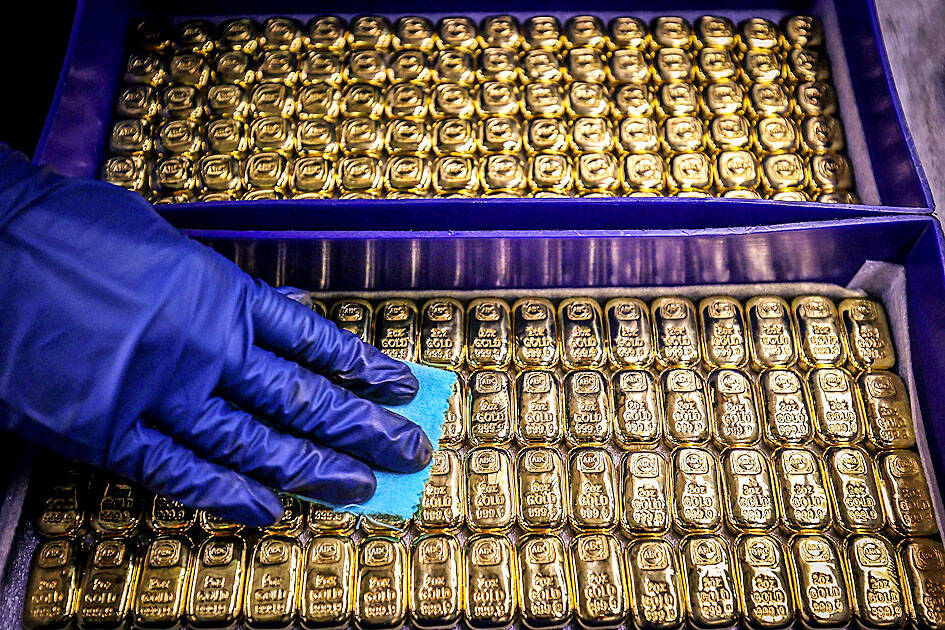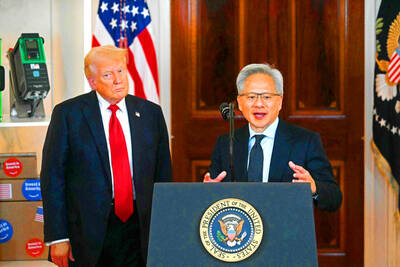Gold prices yesterday broke US$4,000 for the first time as investors piled into the safe haven over expectations for US interest rate cuts and worries about the US government shutdown.
The rally in the precious metal also came after concerns that a tech-fueled rally that has sent some equity markets to record highs might have gone too far, fanning talk of an asset bubble.
Traders have been piling into gold all year, pushing it up more than 50 percent since the turn of the year. Yesterday, the metal climbed to a high of US$4,037.10, even as the US dollar has pushed up against most of its peers in the past few days. Silver was also within a few dollars of its own record high.

Photo: AFP
“The rapid rise in gold prices has been supported by rising inflows into [exchange-traded funds] and central bank buying, including solid demand from China, as gold benefits from political, economic and inflation uncertainty,” National Australia Bank senior economist Taylor Nugent said.
Pepperstone Group research head Chris Weston said that “funds and global reserve managers want a hedge — against fiscal recklessness, currency debasement, and unpredictable government policy — and gold sits squarely at the heart of that movement.”
In contrast, equity markets were more subdued in Asia as questions were asked about the hundreds of billions of dollars that have been invested in artificial intelligence (AI).
On Tuesday, a report that software firm Oracle Corp’s cloud computing profit margin was much lower than expected sent shivers through trading floors, with all three main indices on Wall Street falling into the red.
Tech firms, which have enjoyed strong buying this year, including in the past few months, led selling in Asia, with Alibaba Group Holding Ltd (阿里巴巴) and JD.com Inc (京東) down 1.61 percent and 1.17 percent respectively in Hong Kong, Taiwan Semiconductor Manufacturing Co (TSMC, 台積電) dropping 1.39 percent in Taipei and Renesas Electronics Corp 1.44 percent lower in Tokyo.
“The report on Oracle’s margins prompted investors in US markets to doubt artificial intelligence applications and dump AI related stocks overnight,” Hua Nan Securities Co (華南永昌證券) analyst Kevin Su (蘇俊宏) said, referring to a 0.67 percent decline in the tech-heavy NASDAQ and a 2.06 percent slide on the Philadelphia Semiconductor Index.
“The volatility on US markets gave local investors an excuse to pocket their gains built in recent sessions with TSMC in focus,” after its American depositary receipts lost 2.77 percent on Tuesday, Su said.
“However, I remain upbeat about AI development and have faith in TSMC’s fundamentals. The stock could lead the TAIEX to move higher after consolidation,” he said.
Taipei and Hong Kong were among the biggest losers, with the TAIEX down 0.54 percent and the Hang Seng closing 0.5 percent lower.
Tokyo, Sydney, Mumbai and Singapore also fell, while Wellington, Manila, Bangkok and Jakarta edged up with London, Paris and Frankfurt.
Additional reporting by CNA

Taiwan Semiconductor Manufacturing Co (TSMC, 台積電) last week recorded an increase in the number of shareholders to the highest in almost eight months, despite its share price falling 3.38 percent from the previous week, Taiwan Stock Exchange data released on Saturday showed. As of Friday, TSMC had 1.88 million shareholders, the most since the week of April 25 and an increase of 31,870 from the previous week, the data showed. The number of shareholders jumped despite a drop of NT$50 (US$1.59), or 3.38 percent, in TSMC’s share price from a week earlier to NT$1,430, as investors took profits from their earlier gains

AI TALENT: No financial details were released about the deal, in which top Groq executives, including its CEO, would join Nvidia to help advance the technology Nvidia Corp has agreed to a licensing deal with artificial intelligence (AI) start-up Groq, furthering its investments in companies connected to the AI boom and gaining the right to add a new type of technology to its products. The world’s largest publicly traded company has paid for the right to use Groq’s technology and is to integrate its chip design into future products. Some of the start-up’s executives are leaving to join Nvidia to help with that effort, the companies said. Groq would continue as an independent company with a new chief executive, it said on Wednesday in a post on its Web

CHINA RIVAL: The chips are positioned to compete with Nvidia’s Hopper and Blackwell products and would enable clusters connecting more than 100,000 chips Moore Threads Technology Co (摩爾線程) introduced a new generation of chips aimed at reducing artificial intelligence (AI) developers’ dependence on Nvidia Corp’s hardware, just weeks after pulling off one of the most successful Chinese initial public offerings (IPOs) in years. “These products will significantly enhance world-class computing speed and capabilities that all developers aspire to,” Moore Threads CEO Zhang Jianzhong (張建中), a former Nvidia executive, said on Saturday at a company event in Beijing. “We hope they can meet the needs of more developers in China so that you no longer need to wait for advanced foreign products.” Chinese chipmakers are in

POLICY REVERSAL: The decision to allow sales of Nvidia’s H200 chips to China came after years of tightening controls and has drawn objections among some Republicans US House Republicans are calling for arms-sale-style congressional oversight of artificial intelligence (AI) chip exports as US President Donald Trump’s administration moves to approve licenses for Nvidia Corp to ship its H200 processor to China. US Representative Brian Mast, the Republican chairman of the US House Committee on Foreign Affairs, which oversees export controls, on Friday introduced a bill dubbed the AI Overwatch Act that would require the US Congress to be notified of AI chips sales to adversaries. Any processors equal to or higher in capabilities than Nvidia’s H20 would be subject to oversight, the draft bill says. Lawmakers would have